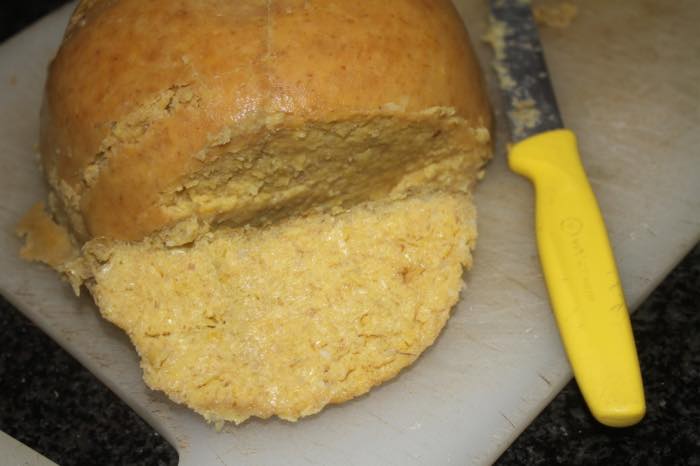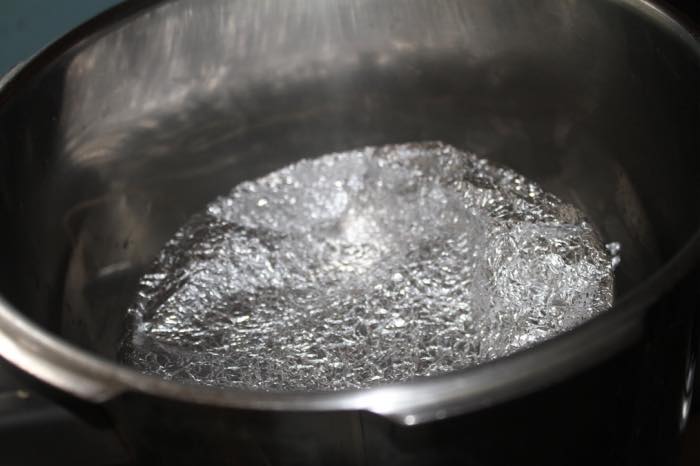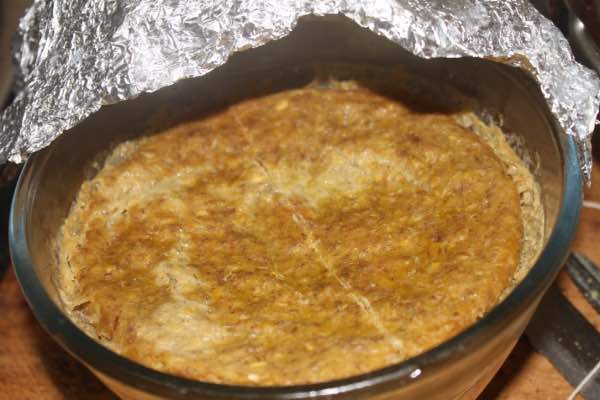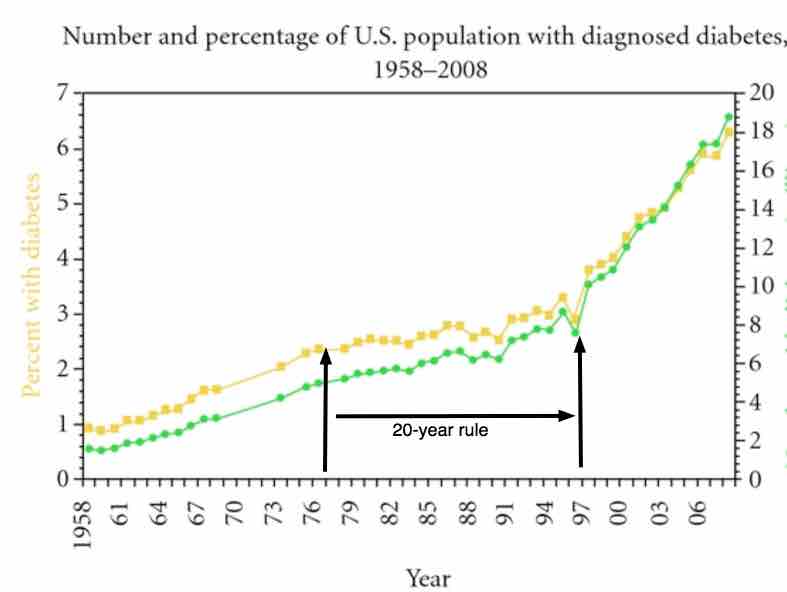How to make homemade cornbread
How to make homemade cornbread steamed in hot water using a pressure-cooker; true whole grains are so hard to find.
I always ask myself 4 questions before embarking on a new dish.
- Is it nutritious? If not, go no further.
- Is it relatively quick? If not question whether it's worth the time.
- Is it tasty? Less important but nevertheless a big factor.
- Does it add something? Why go to all this trouble?
- Nutritious?
- Quick?
- Tasty?
- Add something?
- Definitely, whole grain, low GI.
- Reasonably, 1 hour.
- Very.
- Can retrograde[5], use for hard mealies and less chewy.

How to make moist cornbread
Personally I'm not fond of oven-baked cornbread; there is nothing wrong with it, I just prefer it cooked in steam. It is moister.
The pressure-cooker really comes into its own when making homemade cornbread; it's quicker, has a better texture and uses less energy.
You can use green mealies that have passed their sell-by date; too hard to enjoy as corn on the cob.
Cornbread recipe
- 2.5 cups of minced green mealies
- 1/4 cup of wholemeal flour
- 1 tsp of honey
- 1/2 tsp baking powder
- 1 beaten egg
- 3 TBSP of sour cream or butter-milk
- 1/2 tsp salt

Recipe for hot water cornbread
- Grease an enamel or glass basin.
- Mince the green mealies.
- Mix all the ingredients together.
- Pour into the basin leaving 3cm at the top for the homemade cornbread to rise.
- Cover with grease-proof paper, foil or a kitchen towel; tie in place.
- Place the covered basin in a pressure-cooker with 2 cm of water.
- Pressure cook for 30 minutes.
- Allow to retrograde overnight in the refrigerator.
- Reheat and enjoy with butter.

How to grow corn
The average family of 5 may eat 20 to 30 ears per week. Thus is makes sense to plant rows every fortnight so there will always be young corn on the cob for enjoyment and excellent nutrition. They are one of the few easy sources of so-desirable whole grains.
Just 8 cobs a week would for example reduce the prevalence of a malignant breast tumour by a massive 50%[1]. The World Cancer Forum recommends a whole grain at every meal. Knowing how to grow corn could be a life saver.
In our experience however there are usually a few older cobs that no one relishes. Knowing how to make homemade cornbread is a wonderful way to use up these hard ears.
Whole grains
Whilst almost every nutritional guideline is encouraging folk to eat more whole grains, it still accounts for only 16%.
To be honest whole grains are hard to come by; this homemade cornbread is one simple way to increase our consumption. Picking the mealies from our green garden, slicing the pips off the cobs and preparing the dough took less than an hour. 15 portions will feed our family for several days.
Whole wheat flour
There is no need to add any wheat flour to your homemade cornbread. However the gluten does unable the dough to rise and make a lighter cake.
Gluten gets a lot of bad press; but much of the stomach pain and bloating is caused by chemicals that modern bakers use to speed up the process.
Extra protein
Really one need not be concerned about the GI of homemade cornbread made from mealies and wholegrain flour; the protein in the egg does lower it further still.
Nevertheless if you are struggling with your weight, portion size is important; keep the glycemic load down and take a short walk after the meal.
Cornbread recipe with sour cream
Butter, cream and dairy products in general continue to be controversial. No question of it, cattle use a lot of water and contribute greatly to greenhouse gases. The emphasis on cholesterol is being down-sized though since it's been shown that animal fats barely affect the levels in the blood; it is the refined carbs that are the spoke in the wheel.
In the literature it's called "chronic over-consumption of refined carbs."
It's our standpoint that folk enjoying whole grain foods, legumes and plenty of greens need have little fear of butter and cream.
So we enjoy this cornbread recipe with sour cream without anxiety; a little guilt for the negative contribution to the environment. Perhaps we will try olive oil next time. Fats lower the glycemic index of starches; they reduce hunger pangs and give satiety.
The material expressed on this page is gleaned from the nutritional and environmental literature; it is clearly referenced. A plain distinction is made between the author's opinion and that which is scientifically proven. When in doubt consult your health professional.
To suggest a correction or clarification, write to Dr Bernard Preston here. Contact.
How to make homemade cornbread
How to make homemade cornbread using minced green mealies; add some wholemeal flour, a beaten egg and some cream. Steam it for half an hour under pressure.
Remember it's the refined grains that raise our cholesterol and add layers in all the unwanted places.
Once you know how to make homemade cornbread, you could prepare it every week and not add on an ounce.
Nutritious, quick, tasty, add something?
- This dish is 100% whole grain; mainly corn and some wheat flour. It ticks all the right boxes in terms of preventing malignant tumours, cardiovascular disease and type-2 diabetes.
- By using a pressure cooker it is reasonably quick; one hour from start to finish.
- It is extremely delicious.
- By adding an egg and cream the GI of the whole mealies is lowered even further. This is a good way use up ears that are too hard for regular corn on the cob.
Time?
There is one more thought on the time taken to prepare the dish. How does it compare with just eating corn on the cob, plus an egg scrambled with milk and a little cream?
The truth is that it takes a good deal longer; but it does find a use for corn that has passed its sell-by date. It's become too hard to chew.
I know how to make homemade cornbread but I will only spend this extra time when the mealies are getting rather hard; it extends the season so to speak.
Soft green mealies I would choose to eat as corn on the cob every time.
Chewing
I will still chew my homemade cornbread thoroughly. There is strong evidence that masticating properly lowers the likelihood of getting Alzheimer's Disease.
Honey
Don't use a high-grade raw honey for cooking. Heating reduces all the benefits and raises the glycemic index; only one teaspoon.
It's a big step up in nutrition when we get beyond everything having to taste sweet; nearly half of folk on the modern "industrial diet," that's us, are insulin-resistant. That means we either have the disease or are on the doorstep of diabetes; no thank you.
Campbell's twenty-year diabetes rule scares me; keep sugar and refined grains to an absolute minimum.

Whole grains and legumes
It is a bridge too far for virtually everyone, I suppose but we are trying to comply with the Cancer Forum's dictate that we should be having a whole grain and a legume with every meal. We don't succeed but that is the goal.
I have watched too many go through that absolute misery; in season one could easily enjoy a small portion of this homemade cornbread for breakfast, lunch and supper.
- Breakfast: Corn bread and Eggs Parkinson's disease[2].
- Lunch: Cornbread, green salad and hummus[3].
- Dinner: Cornbread in a stew with meat and beans.
Hot water cornbread
So this hot water cornbread is our favourite; it is a true whole grain with a low glycemic index. It has a wonderful texture and does not take hours to prepare.
The pressure-cooker saves time and money; it should be one of the most loved kitchen appliances.
When browsing use right click and "Open Link in New Tab" or you may get a bad gateway signal.
What is cornbread made of?
The advantage of homemade cornbread is you know exactly what it's made of. Buying from the grocery store you have little choice; you have to accept whatever the manufacturer chooses.
So now you can decide. Will you choose true whole cornmeal that is full of fiber, vitamins and minerals? What shortening will you use? The seed oils and margarine that manufacturers love or will you decide on buttermilk and cream for example?
Those enjoying whole foods need have no fear of butter and full cream milk; their cholesterol won't be raised in any case.
Traditionally it is made using only the finest ingredients; wholegrain cornmeal, 100% flour and dairy products. Usually there will be an egg but no sugar.
Nearly 20% of folk enjoying typical grocery store foods that would include an industrial cornbread are suffering from Fatty Pancreas. The result is hypertension, obesity and diabetes.
Throw in double the risk of incurable pancreatic cancer; choose homemade cornbread.
Now that you know how to make homemade cornbread it cuts right across that; none of the sugar, refined grains and seed oils that are our downfall. You're unlikely to find it at the supermarket.
Newsletter
Our newsletter is entitled "create a cyan zone" at your home, preserving both yourself and Mother Earth for future generations; and the family too, of course. We promise not to spam you with daily emails promoting various products. You may get an occasional nudge to buy one of my books.
Here are the back issues.
- Lifestyle and ideal body weight
- What are ultra-processed foods?
- Investing in long-term health
- Diseases from plastic exposure
- Intensive lifestyle management for obesity has limited value
- A world largely devoid of Parkinson's Disease
- The impact of friendly bacteria in the tum on the prevention of cancer
- There's a hole in the bucket
- Everyone is talking about weight loss drugs
- Pull the sweet tooth
- If you suffer from heartburn plant a susu
- Refined maize meal and stunting
- Should agriculture and industry get priority for water and electricity?
- Nature is calling
- Mill your own flour
- Bake your own sourdough bread
- Microplastics from our water
- Alternative types of water storage
- Wear your clothes out
- Comfort foods
- Create a bee-friendly environment
- Go to bed slightly hungry
- Keep bees
- Blue zone folk are religious
- Reduce plastic waste
- Family is important
- What can go in compost?
- Grow broad beans for longevity
- Harvest and store sunshine
- Blue zone exercise
- Harvest and store your rainwater
- Create a cyan zone at your home
Did you find this page interesting? How about forwarding it to a friendly book or food junkie? Better still, a social media tick would help.
Address:
56 Groenekloof Rd,
Hilton, KZN
South Africa
Website:
https://www.bernard-preston.com